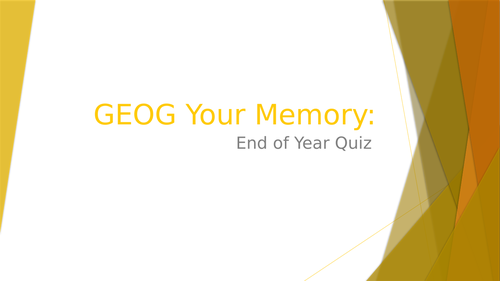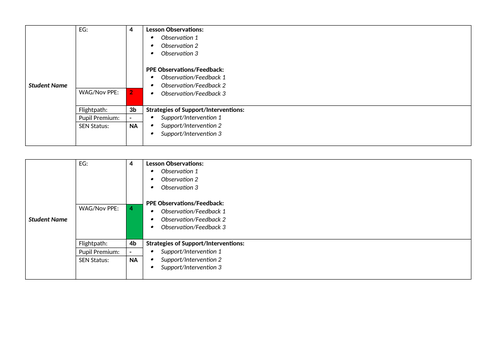39Uploads
10k+Views
2k+Downloads

GEOGraphy Your Memory - End of Year Quiz
End of school year geography quiz to “GEOG” your memory. suitable for all ages at secondary as questions are general trivia, landmarks/buildings and obscure flags etc, no alignment to GCSE specs etc.
Rounds:
Round 1: General Trivia (20 questioins) - 20x 1 point
Round 2: Landmarks/Buildings (10 questions) - 10x 2 points, 1 for name of landmark and 1 for location
Round 3: Obscure Flags (10 questions) - 10x 1 point for name of country/territory/location
All answers provided with animation.
Total points available: 50
Bundle

Tectonics - Unit of Work
Nine lesson unit of work that provides and introduction to tectonic hazards with a focus on earthquakes, including case study lessons.
All lesson presentations and resources for activities and/or tasks included.
Aimed at year 7 or early Key Stage 3 students.

Geography Keyword Keys - Display
A3 keys with important geography vocabulary inside, can be used as a display altogether or laminated and placed individually around a classroom room.
Words can also be edited to suit needs of students and the specification/SoWs of school.

Tectonics: L6 LIDC Earthquake Case Study
Case study lesson of an earthquake in an LIDC (low income developing country) - Haiti, 2010.
Lesson objectives:
Students will be able to describe the short and long term effects of the Haiti earthquake.
Students will be able to evaluate whether the level of development effects the level of damage caused by an earthquake.

Tectonics: L2 Earths Structure & Resources
Lesson two of topic for a year 7/early KS3 scheme of work covering tectonic hazards with a focus on earthquakes. Lesson presentation and all resources included.
Lesson Objectives:
Students must be able to label the structure of the Earth
Students should be able to understand and explain why and where earthquakes occur

Tectonics: L3 Earthquakes & Resources
Lesson three of this ‘Tectonics’ topic aimed at year 7/KS3, introduces students to what an earthquake is and what causes them to happen. A full lesson presentation and all corresponding task resources are included.
Lesson objectives:
Students must be able to locate where earthquakes happen.
Students should be able to use a range of geographical keywords to describe what an earthquake is like.

Biodiversity Management in Madagascar
Case study fact file with about how biodiversity is being managed on the island of Madagascar.

Long Profile of a River
A5 (x2 per A4 page) stick in resource providing students learning about Rivers a visual overview of the three stages of a river course, the main features that we find and where they are located.

US States Word Search
A word search containing most* of the US States with a difficulty rating of advanced.
Not all fit due to the layout/construction of the word search itself.

Geography Skills Keyword - Word Search
A word search featuring 29 keywords from the ‘Geography Skills’ topic.
This resource is perfect as a starter or plenary activity within an introduction to geography scheme of work aimed at year 7 students or early KS3.

Tectonics: L7 AC v LIDC Comparison
Students will learn to make comparisons and assess the impacts of a tectonic events on different countries.
Lesson objectives:
Students will be able to compare the impacts of the the Christchurch and Haiti earthquakes and identify which country was most affected using evidence.
Students will be able to assess in detail the impacts of the Christchurch and Haiti earthquakes and justify which one was most affected.

The BIG Geography Quiz 2020
A fun but challenging geography themed quiz to have some fun with your classes in the build up to the festive break. All answers included at the end of the PowerPoint and a challenging ‘closest answer’ tie breaker question available to decide your quiz winner/ winning team.
This will take about 50 minutes to run through and mark. Only paper/books needed to write the answers down.
Rounds include:
Flags
Landmarks
Spot the Mistake
Geo-Politics
Christmas (Geog connection)

Earth's Structure (Tectonics) - Worksheet
Full colour worksheet that requires students to label the different parts of the earth’s structure. Works well as a ‘Do Now’ (starter) or recap activity as part of a lesson with a tectonics themed scheme of work.
Includes detail on depth of the layers and an area for students to gather additional information.

Tectonics: L8 Volcanoes
An introduction to volcanoes and the relationship between tectonics, plate boundaries and earthquakes.
Lesson objectives:
Students must be able to explain where volcanoes are found and what causes them to erupt.
Students should be able to identify the positive and negative consequences to living near volcanoes.

Geography Careers Information
Compiled list of more than 30 QR codes that provide direct and detailed access to a range of careers that can be pursued with a geography background from GCSE all the way up to degree level.
Information includes what the job/career entails, the qualification/s required, the level of pay and the route of progression that can be expected.
A simple but hopefully effective way of promoting geography as a valuable subject that offers great future prospects and opportunities.

Parents Evening - Student Feedback Proforma
Template document for collating key data, observations feedback and intended strategies of support for GCSE students to raise attainment and engagement in lessons. This can then be used to feeback on a students progress during parents evenings.
Helps you to know and understand your students better, tailor your planning to meet needs more individually and demonstrate how you intend to raise achievement. Great to use as additional evidence for NQTs, supporting data during learning dialogues and learning walks.
Fields included:
Expected Grade
Working at Grade/PPE Result
Flightpath
SEN Status: Yes/No
PP: Yes/No
Lesson Observations - to gather/record how students perform/engage in lessons.
PPE Observations & Feedback - to gather record WWW and EBIs of mock exams.
Strategies of Support/Interventions - how you as the class teacher intend to support and raise student attainment.

GCSE Geography OCR B – Self Assessment/RAG
GCSE Geography OCR B: Geography for Enquiring Minds – Self Assessment / RAG rating document for students to review how confident they feel with each of the 8 topics, plus the elements and case studies within.
By given each element a RAG rating (red, amber, green) teachers are able to identify knowledge and/or confidence gaps to best support students with revision on an individual basis.
Document also includes an opportunity for students to review revision methods, which they find most useful and why.
Please amend case studies to match those studied at your school.
Topic information can be changed to allow use in any subject!

OCR Changing Climate - Revision Grid
Threshold Concept Grid (TCG) revision resource for the OCR B Geography for Enquiring Minds ‘Changing Climate’ topic. Includes completed teacher answer sheet.
To be completed in three phases:
10/15 mins using only student knowledge
5/10 mins using student work book, knowledge organisers etc.
5 mins with teacher input and student contributions
May require adjustments for school specific case studies.

Exam GCSE Question Command Words
Command words and definitions are specific to the OCR exam board.
PowerPoint document that can be used as part of a display or used during an introductory lesson to GCSE study to assist students with understanding how GCSE exam questions will be presented to them and how to go about answering.
It is noted that students who clearly identify the instructional direction of questions perform better as they produce a focused answer.






















